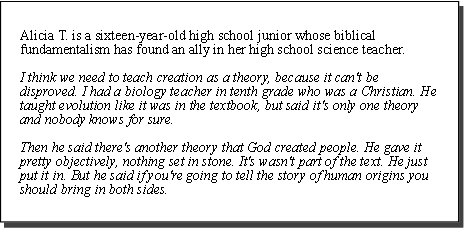
“Science is proof without certainty; faith is certainty without proof.” [Anonymous]
Two little girls were on a class field-trip to the American Museum of Natural History in New York. They ran excitedly into a room filled with life-size models of early human ancestors.
“Look, monkeys!” yelled the first little girl.
“They’re not monkeys,” corrected the other girl. “They’re humans. They just look like monkeys because humans evolved from monkeys.”
“Really?” said the first little girl, obviously amazed.
“Yes, I think so,” replied her friend.
Then their teacher rushed onto the scene with the rest of the class in tow. The children stared wide-eyed as she explained, “These models represent one idea about where humans came from. Some people think we evolved from monkeys like these. But there is another idea that humans and all animals were created by God.”
Who do you think the first little girl believed her friend or her teacher? How did you react to this true story from the Big Apple? Were you delighted or dismayed with the teacher’s account of human origins? It might surprise you to know that everyday in public schools across America a similar version of human origins is being presented in biology and science classrooms. Today there is virtually no debate over teaching that the Earth revolves around the sun. But the teaching of evolution remains an emotionally charged issue.

That’s not legal, you say? Creationism isn’t science, it’s religion and you don’t want your children taught religion in place of science? In fact, a 1987 a Supreme Court decision overturned Louisiana’s “Creationism Act” that required the teaching of “creation science” in public schools whenever the theory of evolution was taught. But the battleground simply shifted from the high bench to the high school classroom where creationists now cloak their fight in more subtle pleadings.
From Friendly, Nevada to Marietta, Georgia, creationism has emerged as a contentious issue for local school boards. Religiously conservative board members are an easier sell than Supreme Court justices. Often, more open-minded members can also be persuaded to vote for “fairness” in balancing the airtime given to what they believe are two equally well-documented theories of human origins. Instead, they are breaking the law of the land by introducing religion into the classroom. These aren’t struggles in a righteous crusade, but skirmishes in a more insidious campaign to control the information and beliefs of society. Who are the creationists and what is their agenda?
God said it, I believe it, and that’s that
Surveys confirm that almost half of all adult Americans identify with the statement: “God created humans pretty much in our present form within the last ten thousand years.” These are the Creationists who believe that human beings are the direct creation of a supernatural Creator, Intelligent Designer, or God.
National polls conducted during the last twenty years have told us a lot about the social, political and demographic profile of Americans who hold a creationist worldview. Most are older, live in the South, and consider religion “very important” in their lives. They tend to belong to fundamentalist Protestant denominations, such as Baptist, that describe themselves as “evangelical.”
Creationism doesn’t always correspond to religious fundamentalism, but most creationists share an unusually strong respect for tradition and authority. Interestingly, more African-Americans and women are likely to be creationists than whites and men.
America is often thought of as the most technologically advanced nation on Earth. But over the past fifty years, polls have also shown that it is one of the most religious. Today 96% of Americans say they believe in a Universal Spirit or God– a larger percentage than in any major European country except Ireland and Northern Ireland.
Worldwide surveys also report that Americans are among the most likely to hold a creationist worldview. We are three times more likely than the Norwegians, and almost five times more likely than the British to believe that “The Bible is the actual word of God and it is to be taken literally, word for word.” In fact creationism hardly exists outside America…